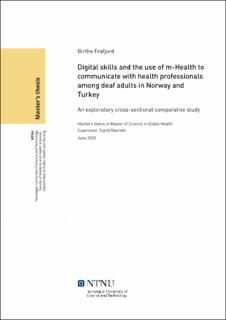| dc.description.abstract | Background: Over the past years, information and communication technology (ICT) has become an essential part of daily life and industry worldwide, including health care. The development of digital health service systems, and particularly m-Health, have increased access to health care services. Deaf people face difficulties when approaching health care services, and e- and m-Health can empower deaf people by having increased control over their health. However, previous studies have not explored if deaf people have the digital skills necessary to use such devices.
Design and methods: This exploratory cross-sectional comparative study explored digital skills and the use of m-Health to communicate with health care providers among deaf adults in Norway and Turkey with a questionnaire. People between the ages of 18-64 with sign language as primary language were recruited in deaf organizations in Stavanger, Trondheim, and Antalya. The participants received a questionnaire that included sociodemographic and deaf-related variables and variables related to ICT usage and m-Health usage. The self-reported experience in digital skills was indexed into a total ICT-score, and the participants were categorized into levels of ICT-users. Descriptive statistics and cross tabulations were used to describe sample differences. Mann Whitney U-test was used to test differences in ICT-score. Regression analysis was used to analyze digital skills among the groups, and logistic regression analysis was performed to assess associations between ICT-scores and the use of m-Health applications. Participants’ characteristics and country were controlled for in the adjusted analysis.
Results: A total of 70 persons participated in the study, where 34 participants were from Turkey, and 36 participants were from Norway. The Norwegian sample had a mean score of 68.12 (level 2), while the Turkish sample had a median ICT-score of 29.18 (level 1). There was a significant difference in ICT-score between the groups (U = 178; p <.01). Both the Norwegian sample and the Turkish sample had extensive experiences in assessing information sharing and the safety of publishing online, as well as using SMS/MMS and participating in network societies such as Facebook and Twitter. Little to no experience was found in creating new information and information management. When adjusting for possible confounders, there was no significant association in ICT-score and communicating with a doctor or a doctor’s office by using a smartphone (OR = 1.037, 95% CI = 1.00, 1.076; p = .053). There was a significant association in ICT-score and sharing information about their health by using a smartphone (OR = 1.058, 95% CI = 1.002, 1.117; p <.05), as well as having an app related to health (OR = 1.058, 95% CI = 1.011, 1.106; p <.05).
Conclusion: The findings suggest that deaf people in Norway and Turkey have differences in their experiences in ICT-usage. A higher ICT-score increases the odds of having an app related to health and sharing health information by using a smartphone. A higher ICT-score will not increase the odds of contacting a health professional by smartphone. m-Health utilization among deaf people should be further explored.
Keywords: digital divide, digital skills, m-health, deaf community | |
